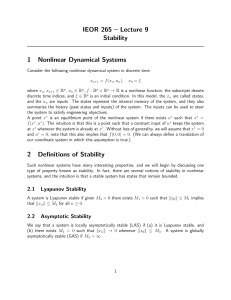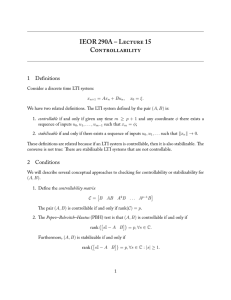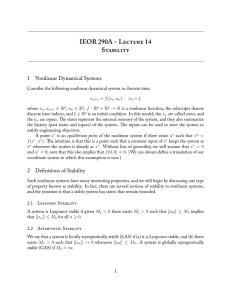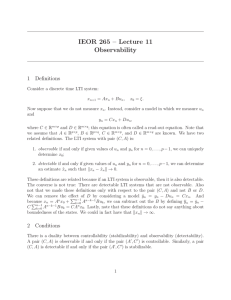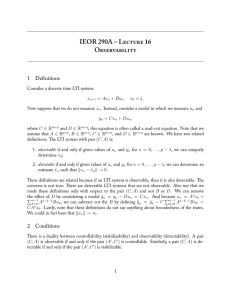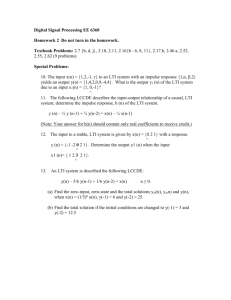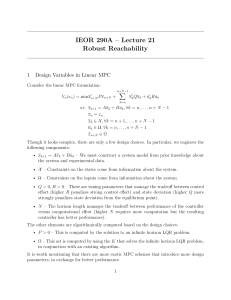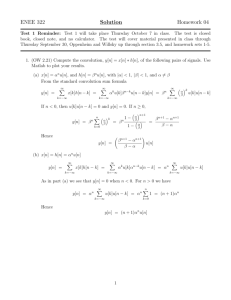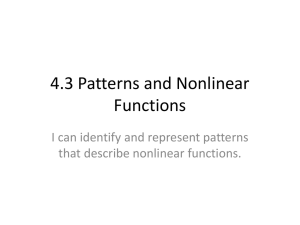IEOR 265 – Lecture 10 Stability 1 Nonlinear Dynamical Systems
advertisement
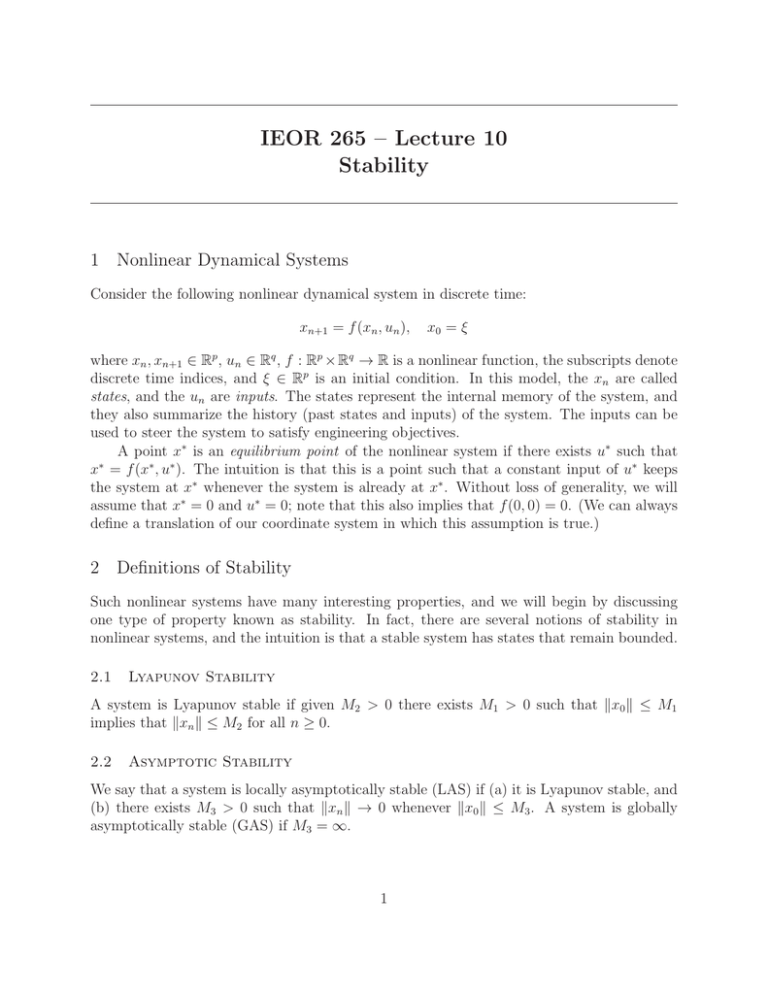
IEOR 265 – Lecture 10
Stability
1 Nonlinear Dynamical Systems
Consider the following nonlinear dynamical system in discrete time:
xn+1 = f (xn , un ),
x0 = ξ
where xn , xn+1 ∈ Rp , un ∈ Rq , f : Rp × Rq → R is a nonlinear function, the subscripts denote
discrete time indices, and ξ ∈ Rp is an initial condition. In this model, the xn are called
states, and the un are inputs. The states represent the internal memory of the system, and
they also summarize the history (past states and inputs) of the system. The inputs can be
used to steer the system to satisfy engineering objectives.
A point x∗ is an equilibrium point of the nonlinear system if there exists u∗ such that
x∗ = f (x∗ , u∗ ). The intuition is that this is a point such that a constant input of u∗ keeps
the system at x∗ whenever the system is already at x∗ . Without loss of generality, we will
assume that x∗ = 0 and u∗ = 0; note that this also implies that f (0, 0) = 0. (We can always
define a translation of our coordinate system in which this assumption is true.)
2 Definitions of Stability
Such nonlinear systems have many interesting properties, and we will begin by discussing
one type of property known as stability. In fact, there are several notions of stability in
nonlinear systems, and the intuition is that a stable system has states that remain bounded.
2.1
Lyapunov Stability
A system is Lyapunov stable if given M2 > 0 there exists M1 > 0 such that kx0 k ≤ M1
implies that kxn k ≤ M2 for all n ≥ 0.
2.2
Asymptotic Stability
We say that a system is locally asymptotically stable (LAS) if (a) it is Lyapunov stable, and
(b) there exists M3 > 0 such that kxn k → 0 whenever kx0 k ≤ M3 . A system is globally
asymptotically stable (GAS) if M3 = ∞.
1
2.3
Exponential Stability
A system is exponentially stable if (a) it is asymptotically stable, and (b) there exists M3 > 0
and α, β > 0 such that kxn k ≤ αkx0 k exp(−βn) whenever kx0 k ≤ M3 . A system is globally
exponentially stable if M3 = ∞.
3 Linear Dynamical Systems
An important special case of a nonlinear dynamical system is the situation in which the dynamics are linear and time invariant. In this case, the linear time invariance (LTI) dynamical
system in discrete time can be described by
xn+1 = Axn + Bun ,
x0 = ξ
where A ∈ Rp×p and B ∈ Rp×q . This special case is useful because it can be analyzed using
powerful machinery from linear algebra.
The first thing to observe is that we can identify every equilibrium point of this linear
system. Note that equilibrium points satisfy
x∗
∗
∗
∗
= 0.
x = Ax + Bu ⇒ I − A B
−u∗
Thus, the set of all equilibrium points
andthe corresponding control inputs is characterized
by the null space of the matrix I − A B .
Stability is relatively straightforward for LTI systems. It turns out that LAS, GAS, and
exponential stability are equivalent for LTI systems. Furthermore, LAS/GAS/exponential
stability imply Lyapunov stability. Given a matrix A, there are multiple ways to check for
exponential stability. An LTI system is exponentially stable if and only if
1. |σ(A)| < 1 (all eigenvalues have magnitude strictly less than one);
2. rank( sI − A ) = p for all s ∈ C : |s| ≥ 1;
3. given any Q > 0, there exists unique P > 0 such that A′ P A − P < −Q; this equation
is known as a Lyapunov equation, and it is a Linear Matrix Inequality (LMI) which
means that it can be represented as a convex feasibility problem; the interpretation is
that x′ P x is an energy function that decreases at rate
x′n+1 P xn+1 − x′n P xn = x′n A′ P Axn − x′n P xn = x′n (A′ P A − P )xn < −x′n Qxn ;
3.1
Bounded-Input Bounded-Output Stability
An LTI system is bounded-input bounded-output (BIBO) stable if there exists 0 ≤ k < ∞
such that for all bounded input sequences {u0 , u1 , . . .} the following holds:
max kxn k ≤ k · max kun k.
n≥0
n≥0
One can think of the k as a gain. It turns out that BIBO stability is equivalent to
LAS/GAS/exponential stability for LTI systems.
2
4 Controllability
Consider a discrete time LTI system:
xn+1 = Axn + Bun ,
x0 = ξ.
We have two related definitions. The LTI system defined by the pair (A, B) is:
1. controllable if and only if given any time m ≥ p + 1 and any coordinate φ there exists
a sequence of inputs u0 , u1 , . . . , um−1 such that xm = φ;
2. stabilizable if and only if there exists a sequence of inputs u0 , u1 , . . . such that kxn k → 0.
These definitions are related because if an LTI system is controllable, then it is also stabilizable. The converse is not true: There are stabilizable LTI systems that are not controllable.
5 Conditions
We will describe several conceptual approaches to checking for controllability or stabilizability for (A, B).
1. Define the controllability matrix
C = B AB A2 B . . . Ap−1 B
The pair (A, B) is controllable if and only if rank(C) = p.
2. The PopovBelevitchHautus (PBH) test is that (A, B) is controllable if and only if
rank sI − A B = p, ∀s ∈ C.
Furthermore, (A, B) is stabilizable if and only if
rank sI − A B = p, ∀s ∈ C : |s| ≥ 1.
3. Consider matrices A such that that |(σ(A))i | < 1. The pair (A, B) is controllable if
and only if the unique solution W to
AW A′ − W = −BB ′
is positive definite (i.e., W > 0). Observe that this is an LMI and can be solved using
convex optimization approaches. Note that this W (if it exists) is equal to
W =
∞
X
Ak BB ′ (A′ )k ,
k=0
which is known as the reachability Gramian.
4. The pair (A, B) is stabilizable if and only if there is a positive definite P > 0 solution
to
AP A′ − P < BB ′ .
Note that this is an LMI and can be solved using convex optimization approaches.
3
6 Linear Feedback
The concepts of controllability and stabilizability are important because of the following
result: An LTI system (A, B) is stabilizable if and only if there exists a constant matrix
K ∈ Rp×q such that choosing state-feedback input u = Kx leads to a stable system
xn+1 = Axn + Bun = Axn + BKxn = (A + BK)xn ,
meaning that the eigenvalues of A + BK lie within the complex unit disc.
The condition of controllability is even more powerful. Let λ1 , λ2 , . . . , λp ∈ C be fixed
complex numbers. If (A, B) is controllable, then there exists a K such that the eigenvalues
of A + BK are precisely the λ1 , λ2 , . . . , λp that were chosen.
7 Finite Horizon Linear Quadratic Regulator (LQR)
Consider the following optimization problem
)
( N
X
min
x′n Qxn + u′n Run : xn+1 = Axn + Bun ,
n=0
where Q > 0 and R > 0 are positive definite matrices. The minimizer is given by un = Kn xn ,
where
Kn = −(R + B ′ Pn B)−1 B ′ Pn A
and Pn is defined recursively by PN = Q and
Pn−1 = Q + A′ (Pn − Pn B(R + B ′ Pn B)−1 B ′ Pn )A.
The value function of this optimization is V (x0 ) = x′0 P0 x0 .
8 Infinite Horizon Linear Quadratic Regulator (LQR)
Consider the following optimization problem
)
(∞
X
x′n Qxn + u′n Run : xn+1 = Axn + Bun ,
min
n=0
where Q > 0 and R > 0 are positive definite matrices. Note that this minimum may not be
finite unless we impose additional restrictions.
In particular, suppose that (A, B) is stabilizable. Then the minimizer is given by un =
Kxn (i.e., state-feedback with constant gain), where
K = −(R + B ′ P B)−1 B ′ P A
4
and P > 0 is the unique solution to the discrete time algebraic Riaccati equation (DARE)
P = Q + A′ (P − P B(R + B ′ P B)−1 B ′ P )A.
The value function of this optimization is V (x0 ) = x′0 P x0 . Furthermore, A + BK is stable.
There is an alternative characterization of this P as the solution to the following LMI:
max tr(P )
s.t. P ≥ 0
′
A PA + Q − P
B′P A
≥ 0.
A′ P B
R + B′P B
5
